Investment consultants are critical stakeholders in the investment chain, advising institutional asset owners on a range of issues, including the selection, appointment and monitoring of external managers.
They can play a key role in supporting asset owners to develop responsible investment practices, and to assess their investment managers’ ESG incorporation and stewardship approaches.
In fixed income, these approaches are still developing, and there are significant knowledge gaps and misconceptions in the industry that need to be overcome, according to investment consultants and asset owners we surveyed in 2020, alongside the advisory committee for the ESG in Credit Risk and Ratings Initiative. This article presents our findings.[1]
Investment consultant take-aways
Although many investment consultants have dedicated ESG resources and are developing ESG questionnaires for investment managers, they are often generic or biased towards equities, where responsible investment practices are more advanced.
As such, investment consultants must adjust their due diligence processes to better meet clients’ fixed income needs, including:
- improving their communication with the investment managers they assess
- strengthening their initial and follow-up ESG assessments
- expanding their ESG fixed income coverage across instruments, strategies and geographies
Asset owner take-aways
Asset owners need to provide investment consultants with more guidance on their fixed income ESG policies and investment objectives, to help improve the services they receive.
Overall take-aways
Investment consultants and asset owners alike recognise that they need to better understand how material ESG factors are for bond risk assessment, especially credit risk.
They also need to take a more nuanced approach to assessing bondholder engagement, which although different from shareholder engagement, can help fixed income investors make more informed decisions and fulfil their duties as responsible stewards of capital.
How do asset owners use investment consultants?
Just over 50% of asset owners report using investment consultants to advise on their external fixed income manager selection, appointment and monitoring.
Figure 1. Does your organisation use consultants to advise and/or support your fixed income external manager selection and appraisal?
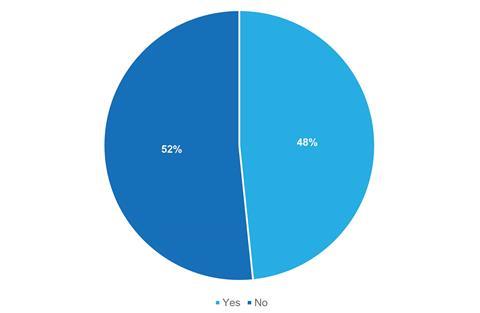
Drilling down on their ESG requirements, asset owners largely want help assessing the ESG integration, engagement or exclusion capabilities of managers, with less focus on assessing managers that offer impact or best-in-class strategies, ESG tilting or climate analytical services.
Some asset owners report wanting assistance on specific fixed income sub-asset classes, including investment grade and corporate debt (39% and 29% respectively), developed market bonds (26%) and sovereign/sub-sovereign debt (19%).
Client demand for ESG incorporation
Interest in ESG incorporation for fixed income has increased over the last 12 months, according to investment consultants, as clients expand their responsible investment policies and increasingly recognise that ESG integration and engagement can enhance investment performance.
Just over 40% of investment consultants say that asset owner interest in the ESG incorporation practices of fixed income managers is high, while 14% say it is very high.
Figure 2. What is the level of interest from clients in the ESG incorporation practices of fixed income managers?
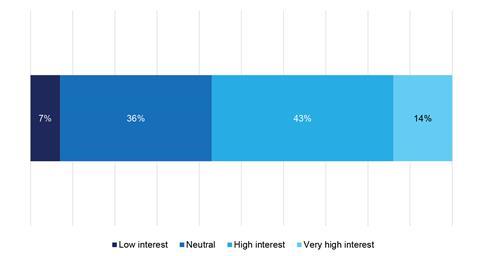
More than 85% of consultants report providing some sort of ESG-related service to clients, with the majority focused on assessing the ESG integration, engagement and screening capabilities of managers. A similar proportion (83%) report that clients are seeking educational services and support.
These results suggest that many asset owners are still developing their ESG incorporation approaches for fixed income, and have less interest in thematic investing or best-in-class products.
Factors dampening demand
Despite the increasing interest from clients – which is expected to continue – investment consultants identified several barriers that can dampen ESG demand in the fixed income space, including:
- a lack of awareness and understanding regarding the materiality of ESG factors to fixed income;
- poor reporting by managers on the impact of ESG considerations within funds and strategies.
Better disclosure from investment managers is likely to help overcome these challenges.
Assessing fixed income managers’ ESG capabilities and practices
Almost all consultants (93%) report that they explicitly take into account how investment managers address ESG factors in their fixed income practices and funds, largely by combining a formal survey with in-person discussions.
For 85%, the assessment covers the investment management firm as well as its fund/strategy-level practices.
Tailored frameworks not the norm
However, only 39% of consultants say they use an ESG framework tailored to fixed income, with 46% indicating they have a standard framework covering all asset classes, and 15% indicating they have no formal framework.
Fixed income approaches lag equities
One-third of consultants think that their ESG approach is more advanced for fixed income than for equities, but 50% believe that their assessment of equity managers is better developed – a finding that matches the perception of asset owners (see ESG expertise of investment consultants).
Figure 3. How important is the ESG information provided by fixed income managers?
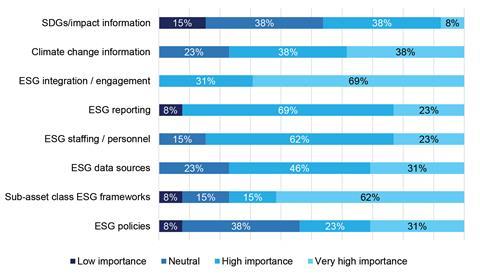
ESG integration and engagement information are critical
Most investment consultants consider information on managers’ ESG policies, fund or sub-asset-class-specific investment frameworks, data sources, personnel, reporting, integration and engagement activities to be critical.
In contrast, 23% are neutral about receiving information related to climate change, while 15% say that information on the sustainable development goals is not important.
Manager disclosures need improvement
Almost a quarter (23%) of consultants are highly dissatisfied with the quality of ESG disclosure by fixed income managers, while 62% are neither satisfied nor dissatisfied.
They suggest that managers should provide better evidence of how ESG factors influence investment decisions, and greater disclosure of how these factors are considered, to help support more nuanced and accurate evaluations of their capabilities.
Figure 4. What is your level of satisfaction regarding the quality of ESG disclosure by managers on their ESG incorporation in fixed income?
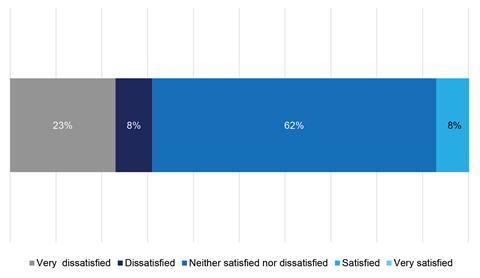
Level of consultant ESG expertise
Around 40% of asset owners rate the ESG fixed income expertise of their investment consultants quite highly, while the same proportion are neutral about their capabilities.
Figure 5. How would you rate your investment consultants’ ESG knowledge in fixed income investing?
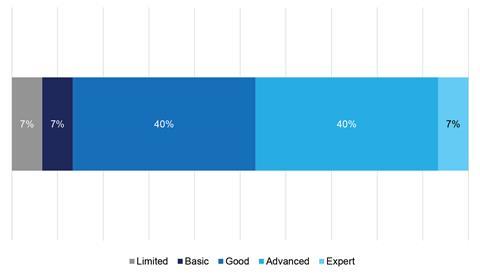
Almost two-thirds (60%) describe their consultants’ ESG assessments as more qualitative than quantitative and 33% think they are equally balanced.
Although 60% of asset owners report that their consultants’ ESG assessments are specific to fixed income, 40% believe they aren’t as rigorous as for other asset classes, such as equities.
Indeed, 33% of asset owners say their consultants take a hybrid approach to assessing the ESG credentials of fixed income managers, asking a mixture of specific and generic questions.
Consultants have dedicated personnel, not always ESG specialists
This is also reflected in the personnel responsible for delivering ESG-related fixed income services at investment consultant firms.
While all consultant respondents report having professionals dedicated to advising clients on their activities, 57% indicate that the responsibility is shared by traditional fixed income analysts and ESG specialists.
Manager questions are often not applicable
The findings correspond with broader feedback received from fixed income investment managers that highlight receiving questions not applicable to the asset class – on proxy voting and shareholder engagement, for example.
Consultants want to improve their knowledge
When asked to rate their own ESG expertise in fixed income, 54% of investment consultant respondents were neutral, indicating that they are neither experts nor that they have limited knowledge. The remainder lean towards being informed.
Nonetheless, many investment consultants recognise that their knowledge of ESG issues in fixed income could be improved, with 73% indicating that they are willing to attend educational webinars to do so.
Respondents indicate wanting more guidance on ESG integration and engagement approaches in corporate bonds and direct lending, followed by sovereign bonds and how these approaches differ between emerging and developed market bonds.
Investment consultants are also interested in briefings about the PRI’s fixed income-related initiatives, and to understand how CRAs are incorporating ESG factors into their products and services.
How material are ESG factors for fixed income investing?
Practitioners in the fixed income industry have not yet reached a consensus regarding the materiality of ESG factors for the asset class, or how such factors can be assessed in the context of certain instruments or issuer types.
To inform future work, and to have a better understanding of how investment consultants think about – and assess – ESG incorporation in fixed income, including where they may have biases, we asked which fixed income assets they think are most impacted by ESG factors.
Figure 6. How relevant are ESG considerations to fixed income investing?
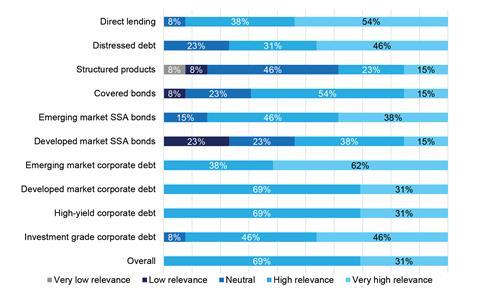
Investment consultants aligned on corporate debt, not on complex assets
Investment consultants are largely aligned on the impact of ESG factors on various types of corporate debt. In contrast, their views diverge on whether ESG factors are material to other, more complex parts of the fixed income universe.
For example, almost a quarter of respondents say ESG factors aren’t material to developed market sovereign, supranational or agency (SSA) bonds, or that they are neither relevant nor irrelevant – potentially reflecting the view that the assessment of ESG factors for sovereign debt is more difficult.
We also asked investment consultants how relevant various ESG incorporation approaches, products and services are for fixed income.
They unanimously agree that ESG integration is relevant or highly relevant to fixed income, while three-quarters say the same about using exclusions or restrictions.
Asset owners have a similar view, with 87% indicating that ESG integration is relevant or highly relevant. Some 67% think that screening is relevant, although 7% say it has very little relevance to the asset class, and another 27% are neutral.
Diverging views on engagement reflect difficulty of practice
Views on how relevant engagement is in the fixed income space are mixed. Nearly a quarter of consultants and 27% of asset owners are neutral or think the practice has little relevance, while 76% of consultants and 53% of asset owners think it is relevant.
This divergence is not surprising. Bondholders face some unique challenges that make engagement complicated, related to their legal and contractual rights and obligations, and many are at an early stage in developing their approaches.
Next steps
The investment consultant industry continues to evolve and further its ESG incorporation efforts, including within fixed income. Firms recognise that developing strong practices can help them to better serve clients, particularly as ESG-focused regulation continues to accelerate in Europe and beyond.
To better understand how we can support investment consultants to build their knowledge of ESG incorporation across various fixed income sub-asset classes, we will begin by engaging with the Investment Consultants Sustainability Working Group in the UK, a body of 17 investment consultant firms that provide services to asset owners.
The ESG in Credit Risk and Ratings Initiative is funded by the Gordon and Betty Moore Foundation through the Finance Hub, which was created to advance sustainable finance.


Appendix 1: Project background
This research is part of the ESG in Credit Risk and Ratings Initiative , which seeks to facilitate a dialogue between credit ratings agencies and investors to cultivate a common language, discuss ESG risks to creditworthiness, and bridge information gaps. In 2020, the initiative broadened its focus to other stakeholders, including investment consultants.
Many investor participants to the initiative felt that while the investment consultant industry has a good grasp of ESG integration for equities, its fixed income expertise has been more mixed, characterised by:
- a lack of understanding regarding issuer types and instruments
- how these impact ESG incorporation and stewardship
Consequently, the ESG assessment frameworks used by investment consultants to assess investment managers can result in inappropriate expectations and inaccurate outcomes. This can present barriers to asset owners effectively selecting managers and hinders efforts to tackle ESG risks and promote real-world outcomes.
The surveys, conducted from July to November 2020, sought to better understand:
- how asset owners use investment consultants for their external fixed income manager selection, appointment and monitoring processes;
- how asset owners view the ESG-related fixed income advisory services that consultants provide;
- to what extent investment consultants assess the ESG incorporation practices of external fixed income managers, and how they rate their level of expertise in doing so; and
- how aligned they are on the materiality of ESG factors in various fixed income sub-asset classes.
The surveys received responses from 15 investment consultants and 31 asset owners. (See Appendix 2 for more details on the respondents.)
Appendix 2: Survey participants
Investment consultants were identified by asset manager members of the initiative.
Figure 7. Type of investment consultants
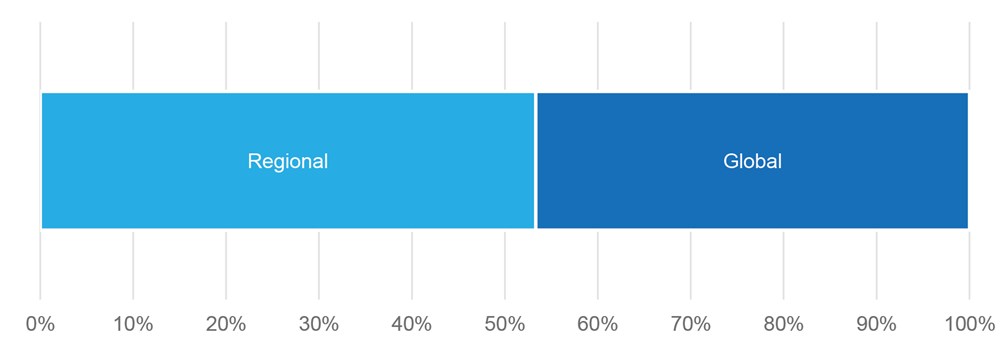
Figure 8. Geographical split of investment consultants
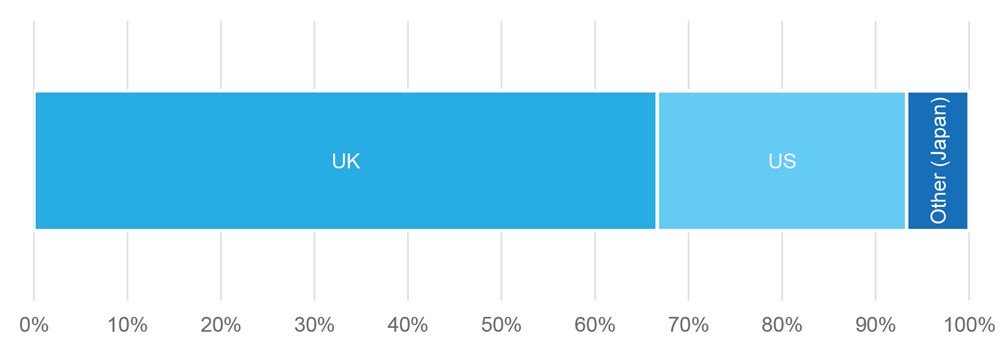
Asset owners were selected based on their status as PRI signatories.
Figure 9. Geographical split of asset owners

Figure 10. Type of asset owners

Downloads
Broadening the outreach to investment consultants
PDF, Size 0.6 mb












